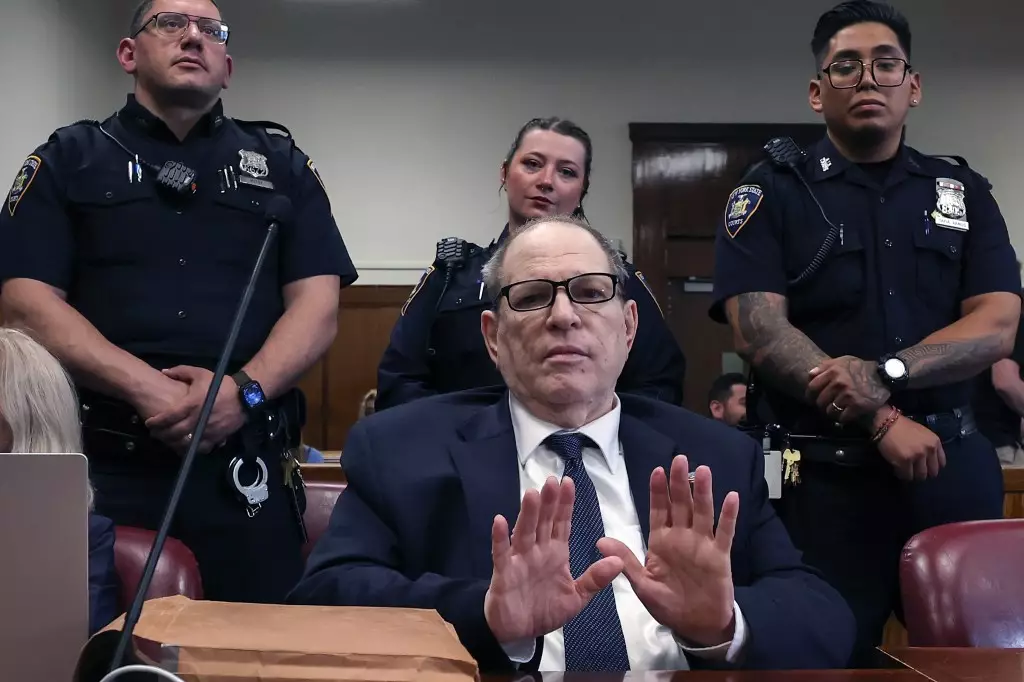The ongoing retrial of Hollywood mogul Harvey Weinstein has unfolded in a courtroom that feels more like a theatrical stage than a judicial setting. With a jury comprised of seven women and five men poised to deliberate his fate, the stakes are immeasurably high for both the accused and the accusers. Weinstein, whose name has become synonymous with the #MeToo movement and its call for accountability in the entertainment industry, has opted for a strategy of silence. This decision raises significant questions about legal tactics, public perception, and the implications of his past actions on his present circumstances.
For a man who once wielded immense power in Hollywood, Weinstein’s circumstances have shifted dramatically. Facing multiple allegations of sexual misconduct spanning decades, he now finds himself not just on trial for his actions, but for the very perception of his character. His decision not to testify underlines a strategic choice that balances the potential for legal self-incrimination against the public relations nightmare of further scrutiny. As his spokesperson, Juda Engelmayer, articulated, the move is rooted in caution rather than evasion—a careful navigation of a very treacherous legal landscape.
Cautious Approach Amidst Controversy
Weinstein’s legal team is acutely aware of the complexities of public sentiment surrounding sexual offenses, especially in the wake of the #MeToo movement that has significantly shifted societal attitudes toward such crimes. His attorney, Arthur Aidala, attempted to lay the groundwork for a defense rooted in the narrative of consensual relationships, framing the encounters with his accusers as “friends with benefits.” This raises an interesting dichotomy between legality and morality—Weinstein is adamant that the actions he is accused of were consensual, while the overarching context of power dynamics complicates this assertion.
Moreover, his decision to engage in a media campaign while refraining from court testimony speaks volumes. In a recent interview, Weinstein declared his innocence, presenting himself as a victim of wrongful accusations. This guerilla PR strategy, particularly notable given his patterns of manipulation and power in Hollywood, hints at a desperate attempt to regain some control over a narrative that has spiraled out of his favor. Yet, how genuine is this effort? The very act of providing a platform for his voice outside of the courtroom could be perceived as an attempt to undermine the judicial process, a calculated risk that could backfire spectacularly.
The Complexity of Judicial Rulings and Public Perception
Weinstein’s past legal battles illuminate a contentious judicial environment. After his original conviction was overturned in 2024, largely due to the controversial admission of “Bad Acts” testimonies, the narrative surrounding him grew murkier. The law’s intricacies can sometimes serve as a shield for the guilty, raising concerns over whether the judicial system can adequately address the complexities surrounding sexual assault cases. The introduction of a new judge and additional charges reflects the fluid nature of the legal proceedings, demonstrating how the interplay of politics and law can dramatically shift outcomes.
Moreover, the societal plains upon which these dramas unfold cannot be ignored. The cultural reckoning initiated by the #MeToo movement has propelled discussions around consent, power, and accountability to the forefront. For Weinstein, these conversations represent an existential threat, as they challenge not only the specifics of his actions but also the broader culture of silence that allowed such behavior to persist unchallenged for so long. Therefore, every legal maneuver he and his team undertake is under a relentless microscope, scrutinized through the lens of public morality and the shifting tides of cultural awareness.
The Inevitable Reckoning of Accountability
As the retrial proceeds, one cannot help but contemplate the larger implications of Weinstein’s case. Should he be found guilty once more in New York, he could face the prospect of spending the rest of his life behind bars, a fate perhaps just for a figure who has repeatedly exploited his power at the expense of others’ welfare. Each day of the trial unfolds not just as a battle for legal vindication but as a broader statement about the justice system’s ability to confront high-profile sexual assault cases effectively.
Weinstein’s silence may serve a tactical purpose in this high-profile battle for his freedom, but it inherently resonates with a profound irony. In a culture that increasingly demands accountability and transparency, choosing not to speak in one’s defense sends a chilling message about the nature of guilt, innocence, and the societal obligations we bear toward one another. As his fate looms over the horizon, the world watches—not merely for the outcome of a trial but for an indication of how much justice has truly shifted in the shadow of the #MeToo movement.
